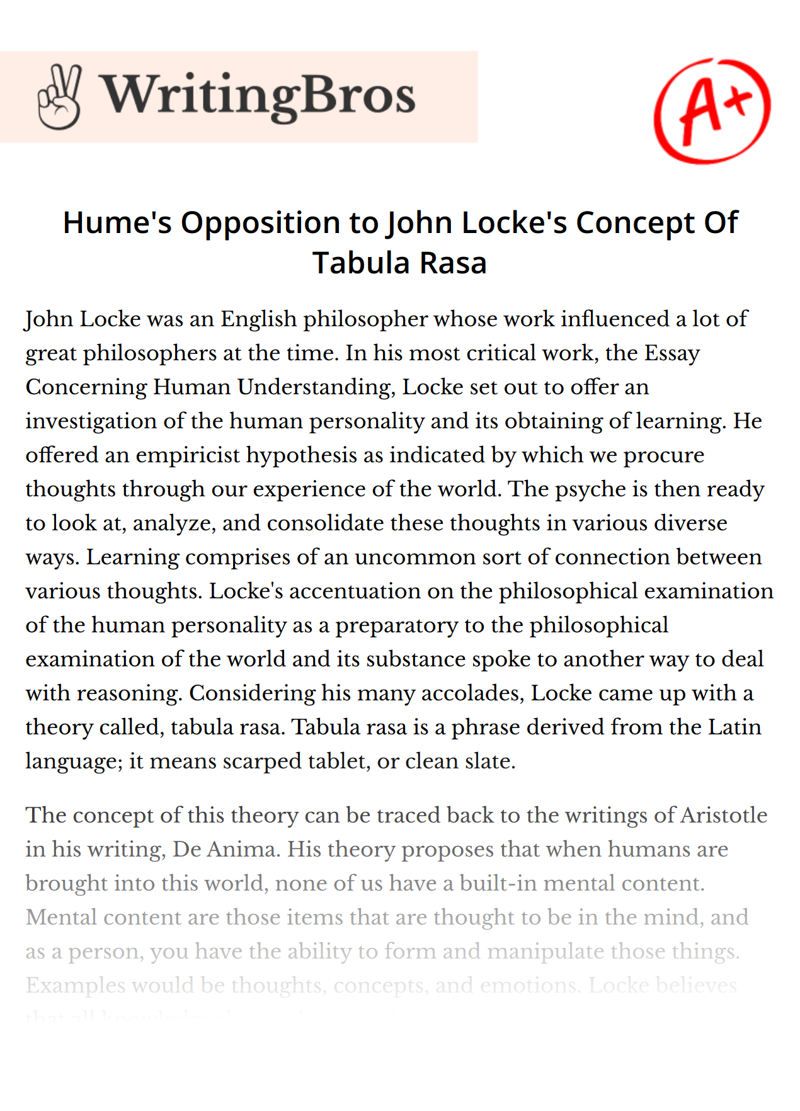Hume's Opposition to John Locke's Concept Of Tabula Rasa

John Locke was an English philosopher whose work influenced a lot of great philosophers at the time. In his most critical work, the Essay Concerning Human Understanding, Locke set out to offer an investigation of the human personality and its obtaining of learning. He offered an empiricist hypothesis as indicated by which we procure thoughts through our experience of the world. The psyche is then ready to look at, analyze, and consolidate these thoughts in various diverse ways. Learning comprises of an uncommon sort of connection between various thoughts. Locke's accentuation on the philosophical examination of the human personality as a preparatory to the philosophical examination of the world and its substance spoke to another way to deal with reasoning. Considering his many accolades, Locke came up with a theory called, tabula rasa. Tabula rasa is a phrase derived from the Latin language; it means scarped tablet, or clean slate.
The concept of this theory can be traced back to the writings of Aristotle in his writing, De Anima. His theory proposes that when humans are brought into this world, none of us have a built-in mental content. Mental content are those items that are thought to be in the mind, and as a person, you have the ability to form and manipulate those things. Examples would be thoughts, concepts, and emotions. Locke believes that all knowledge that we learn is obtained through experience and perception. Our ideas are created from external forces or the environment. The idea is that through these external forces, we formulate an idea. Thus, having that idea in our minds, when we use our own perception and interior motives, we change those simple ideas into more complex ones. Very much alike to the nurture theory, Locke’s theory depends heavily on the environment and our surroundings. Furthermore, Locke’s idea suggests that humans have a freedom to be the authors of their own soul. They have the power and ability to shape and form their character.
On the other hand, David Hume was a Scottish philosopher and historian. His works in philosophical empiricism, skepticism, and naturalism have greatly impacted and influenced many philosophers around the world. Hume has a place with the convention of British induction that incorporates Francis Bacon, John Locke, and George Berkeley.
Regular to this convention is the view that learning is established upon sense-recognition, which the human personality inactively gets. Be that as it may, while Locke and Berkeley trust that human learning can go past sense-involvement, Hume battles in the Introduction of his Treatise that our insight is restricted to detect understanding, thus offers an experimentation that he contends is more reliable than those of his British ancestors. Hume's examination of the substance of sense-encounter starts with the refinement amongst impressions and thoughts. Impressions, which incorporate every one of our sensations and interests, are powerful and exuberant than thoughts. Thoughts are epistemologically mediocre compared to impressions, and the optional status that Hume gives them remains in stamped complexity to a long custom in Western theory which affirms that widespread thoughts are the best possible objects of the human intellect.
Following Locke, Hume likewise recognizes the basic and complex. Straightforward impressions and thoughts, for example, the envisioning of a color, concede to no qualification or detachment. Complex impressions and thoughts, for example, the seeing or envisioning of an orange, can be examined into their segment parts. While every single basic thought are gotten from and precisely speak to straightforward impressions, numerous perplexing thoughts are not, thus their veracity must be raised doubt about. Hume continues to demonstrate that various complex thoughts in logic, for example, the possibility of an irrelevant self as the center of individual personality, neglect to meet his empiricist basis. Be that as it may, the most well-known subject of his feedback is the connection between cause and effect. Western savants and researchers customarily trusted that to know something completely one must know the reason whereupon it fundamentally depends.
Hume contends that such learning is inconceivable. He takes note of that the causal relationship gives the premise to all explanations concerning matters of reality; in any case, not at all like the relations of thoughts investigated by science, no judgments that worry matters of certainty are essentially valid. This is on the grounds that we can simply envision, without logical inconsistency, the opposite of each self-evident. Hume includes that the causal connection between any two articles depends on understanding, and isn't known from the earlier. Yet all that experience builds up concerning causal connections is that the reason is earlier so as to and adjacent with its impact.
Experience can't set up a fundamental association amongst circumstances and end results, since we can envision without logical inconsistency a situation where the reason does not deliver its typical. The motivation behind why we erroneously surmise that there is something in the reason that essentially delivers its impact is on the grounds that our past encounters have habituated us to think thusly. That is, on account of we have found in the past that B as often as possible takes after A and never happens without it, our mind partners B with A to such an extent that the nearness of one decides the psyche to think about the other.
Cite this Essay
To export a reference to this article please select a referencing style below

